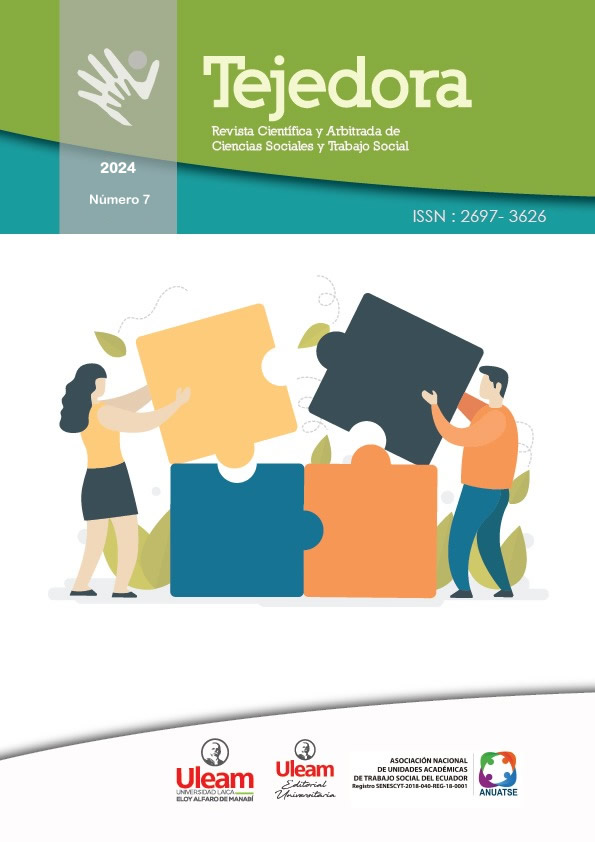STUDY HABITS AND ACADEMIC STRESS IN UNIVERSITY STUDENTS IN PSYCHOPEDAGOGY
DOI:
https://doi.org/10.56124/tj.v7i16.004Keywords:
academic stress, academic performance, study habitsAbstract
The present study was developed considering the need to determine risk factors in relation to academic stress and study habits, which influence the learning process. The general objective was to determine the influence of academic stress on the application of study habits in students of the Psychopedagogy Career of the National University of Chimborazo, Riobamba – Ecuador. We worked with a quantitative approach. The research design is non-experimental, descriptive correlational. The sampling defined in this research was non-probabilistic-intentional, having a sample of 50 students. The participants contributed through their responses through the “CASM-85 Study Habits Inventory” and the “Sisco Academic Stress Inventory” questionnaires. The work procedure and the results obtained made it possible to show that there is the presence of signs or symptoms of academic stress, the main stressors being the overload of homework and schoolwork, the teachers' evaluations, the type of work requested by the teachers and the time allocated to complete the work. The students' tendencies were identified in relation to their study habits, which are mostly focused on the categories that include “positive” aspects. Finally, it was determined that there is a correlation between the academic performance of the students and the study habits used, although most of them maintain categories focused on the "positive", it must be considered that each category maintains different characteristics and recommendations for improvement to the application of study habits.
Downloads
References
Alfonso, B., Calcines, M., Monteagudo, R., y Nieves, Z. (2015). Estrés Académico. EDUMECENTRO, 7(2), 163–178. https://summa.upsa.es/high.raw?id=0000033512&name=00000001.original.pdf
Bedolla Solano, R. (2018). Programa educativo de técnicas y hábitos de estudio para lograr aprendizajes sustentables en estudiantes de nuevo ingreso al nivel superior. Revista Iberoamericana de Educación, 76(2), 73–94. https://doi.org/10.35699/1982-3053.2020.26475
Cruz Núñez, F., y Quiñones Urquijo, A. (2011). Hábitos de estudio y rendimiento académico en enfermería, Poza Rica, Veracruz México. Actualidades Investigativas En Educación, 11(3), 1–17. https://doi.org/10.15517/aie.v11i3.10219
Domjam, M. (2009). Principios de aprendizaje y conducta (5th ed.). Paraninfo.
El Sahili, L. (2010). Trastornos neurológicos, hormonales y psicológicos. In Paper Knowledge . Toward a Media History of Documents (1st ed.). Universidad de Guanajuato. http://www.biblioteca.cij.gob.mx/Archivos/Materiales_de_consulta/Drogas_de_Abuso/Articulos/TrastornosNeurologicos.pdf
Escalante, L., Escalante, Y., Linzaga, C., y Merlos, M. E. (2008). Comportamiento de los estudiantes en función a sus hábitos de estudio. Revista Electrónica “Actualidades Investigativas En Educación,” 8(2), 1–15. http://revista.inie.ucr.ac.cr
Feldman, L., Goncalves, L., Chacón-Puignau, G., Zaragoza, J., Bagés, N., y De Pablo, J. (2008). Relaciones entre estrés académico, apoyo social, salud mental y rendimiento académico en estudiantes universitarios venezolanos. Universitas Psychologica, 7(3), 739–751.
Hernández-Herrera, C. A., Perego-Rodríguez, N., y Garza-Vargas, Á. E. (2012). Los hábitos de estudio y motivación para el aprendizaje de los alumnos en tres carreras de ingeniería. Revista de La Educación Superior, 41(163), 67–87. http://www.redalyc.org/articulo.oa?id=60425380005
Hernández, M. (2015). Unitec/Blog. Recuperado el 12 de octubre de 2019 de https://blogs.unitec.mx/vida-universitaria/habitos-estudio-influencia-aprendizaje.
Marín, D. (2009). Psicología del aprendizaje universitario. La formación en competencias: Vol. XXXIII. Morata. http://books.google.com/books?hl=en&lr=&id=v5lyAgAAQBAJ&pgis=1
Martín, I. (2007). Estrés académico en estudiantes universitarios. Apuntes de Psicología, 25(1), 87–99. https://doi.org/10.14201/eks.5789
Mondragón Albarrán, C. M., Cardoso Jiménez, D., y Bobadilla Beltrán, S. (2017). Hábitos de estudio y rendimiento académico. Caso estudiantes de la licenciatura en Administración de la Unidad Académica Profesional Tejupilco. RIDE Revista Iberoamericana Para La Investigación y El Desarrollo Educativo, 8(15), 661–685. https://doi.org/10.23913/ride.v8i15.315
Obiols, G. (2007). Cómo estudiar (1st ed.). Novedades Educativas.
Pacheco, N. (2014). LA EDUCACIÓN EN EL DISCURSO DEL MÉTODO DE R. DESCARTES. Cuadernos Salmantinos de Filosofía, 41, 295–310. https://summa.upsa.es/high.raw?id=0000033512&name=00000001.original.pdf
Román, C., Hernández, Y., y Escuela Latinoamericana de Medicina. (2011). EL ESTRÉS ACADÉMICO: UNA REVISIÓN CRÍTICA DEL CONCEPTO DESDE LAS CIENCIAS DE LA EDUCACIÓN. Revista Electrónica de Psicología Iztacala., 14(2), 1–14.
Vicuña, L. (1999). Inventario de Hábitos de Estudio CASM-85. Lima-Perú: CEDEIS
Published
How to Cite
Issue
Section
License
Copyright (c) 2024 Revista Científica y Arbitrada de Ciencias Sociales y Trabajo Social: Tejedora. ISSN: 2697-3626

This work is licensed under a Creative Commons Attribution-NonCommercial-ShareAlike 4.0 International License.






















